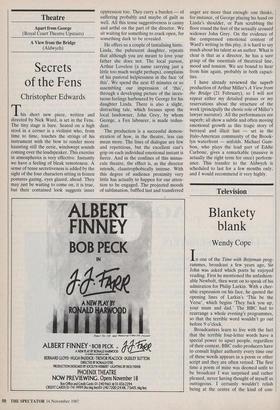Theatre
Apart from George (Royal Court Theatre Upstairs)
A View from the Bridge (Aldwych)
Secrets of the Fens
Christopher Edwards
This short new piece, written and directed by Nick Ward, is set in the Fens. The tiny stage is bare. Seated on a high stool in a corner is a violinist who, from time to time, touches the strings of his instrument with the bow to render more haunting still the eerie, windswept sounds coming over the loudspeaker. This exercise in atmospherics is very effective. Instantly we have a feeling of bleak remoteness. A sense of tense secretiveness is added by the sight of the four characters sitting in frozen postures gazing, eyes glazed, ahead. They may just be waiting to come on, it is true, but their contained look suggests inner oppression too. They carry a burden — of suffering probably and maybe of guilt as well. All this tense suggestiveness is canny and artful on the part of the director. We sit waiting for something to crack open, for something dark to be revealed.
He offers us a couple of tantalising hints. Linda, the pubescent daughter, repeats that although you are meant to love your father she does not. The local parson, Arthur Loveless (a name carrying just a little too much weight perhaps), complains of his pastoral helplessness in the face 'of this'. We spend the next 45 minutes or so assembling our impression of 'this', through a developing picture of the inces- tuous feelings harboured by George for his daughter Linda. There is also a slight, distracting tale, which focuses upon the local landowner, John Grey, by whom George, a Fen labourer, is made redun- dant.
The production is a successful demon- stration of how, in the theatre, less can mean more. The lines of dialogue are few and repetitious, but the excellent cast's grip on each individual emotional instant is fierce. And in the confines of this minus- cule theatre, the effect is, as the director intends, claustrophobically intense. With this degree of audience proximity very little has actually to happen for our atten- tion to be engaged. The projected moods of sublimation, baffled lust and transferred anger are more than enough: one thinks, for instance, of George placing his hand on Linda's shoulder, or Pam scrubbing the floor round the feet of the sexually aroused widower John Grey. On the evidence of the compressed emotional content of Ward's writing in this play, it is hard to say much about his talent as an author. What is clear is that as a director, he has a sure grasp of the essentials of theatrical line, mood and tension. We are bound to hear from him again, probably in both capaci- ties.
I have already reviewed the superb production of Arthur Miller's A View from the Bridge (21 February), so I will not repeat either my detailed praises or my reservations about the structure of the work (principally the choric role of Miller's lawyer narrator). All the performances are superb; all show a subtle and often moving emotional growth as this tragic story of betrayal and illicit lust — set in the Italo-American community of the Brook- lyn waterfront — unfolds. Michael Gam- bon, who plays the lead part of Eddie Carbone, gives a remarkable (massive is actually the right term for once) perform- ance. This transfer to the Aldwych is scheduled to last for a few months only, and I would recommend it very highly.










































































 Previous page
Previous page